Interviews
Director Chie Hayakawa Interview: ‘Plan 75’ film, Japanese Elderly Isolation
Published
2 years agoon
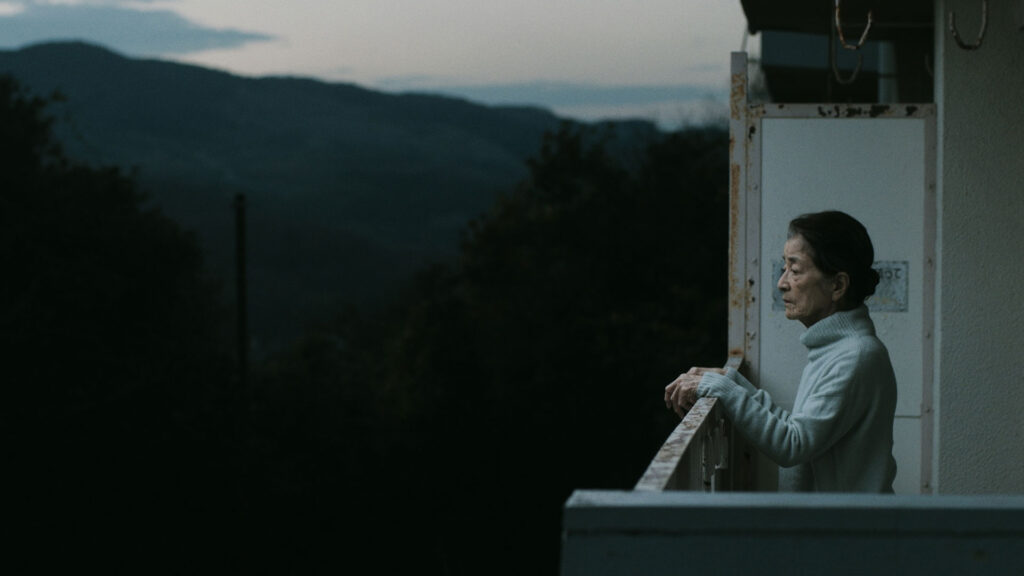
Director Chie Hayakawa spoke to The Natural Aristocrat about her powerful film ‘Plan 75’. Discussing the social isolation of Japanese seniors, age discrimination in the labor force… And the realism of a faux government plan that allows the elderly to check out voluntarily.
This interview with ‘Plan 75’ Director Chie Hayakawa contains spoilers for the film.
– ‘Plan 75’ will begin playing at New York City’s IFC Center on April 21. Director Hayakawa will do a special Q & A session there on April 21, 22, and 23.
THE NATURAL ARISTOCRAT (NIR REGEV): According to a survey conducted by Japan’s National Institute of Population and Social Security Research, 15% of elderly males only have a conversation with someone else once every two weeks. 30% have no reliable person to assist them in any way.
Plan 75 greatly spotlighted the endemic social isolation of Japanese seniors. Michi Kakutani (actress Chieko Baishô) was so grateful to a college age woman for just listening to her that it was heartbreaking. Can you elaborate on your own research on the rampant elderly isolation in Japan?
CHIE HAYAKAWA: Well, actually I met about 10 to 15 elderly women while I was writing the script. And I asked for their life stories, how they live and what they thought about Plan 75.
I remember one of them said that because she’s living alone, she doesn’t have a chance to talk to others. So it’s common that she doesn’t say any word for three or five days in a row.
Then when someone called to her, when she picked up the phone, her voice doesn’t come out promptly. She said it happened because she didn’t speak for many days.
I felt that she’s really isolated. But I think women tend to make a community and meet with their friends more compared to men.
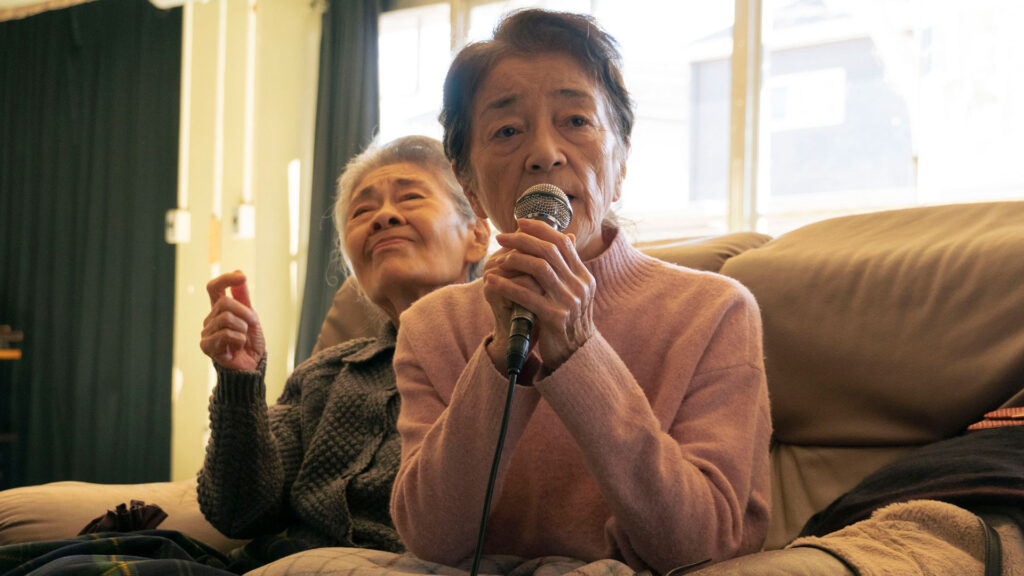
Chieko Baishô in ‘Plan 75’ film. Photo Credit: © Chie Hayakawa, Kimstim Films, Dongyu Club.
Men are more likely to be isolated if they don’t have friends after retiring from their company. They tend to dedicate themselves fully to their job… But after they retire, they don’t know what to do. It’s hard for them to make friends and connect to the community.
But in either way, men or women, I think it depends on if they are financially fit. If they don’t have money to meet people, it’s common that they easily get isolated.
THE NATURAL ARISTOCRAT: It appeared Michi was subtly forced into Plan 75 by being repeatedly denied for employment due to open age discrimination. Welfare offered in spite of her will to work.
She was essentially made to feel like an outsider from society. Can you give insight to age discrimination practices in Japan?
CHIE HAYAKAWA: I think ageism does exist in Japan and TV & the media are stroking fear of being old. They’re creating a potential outlet for people’s anger and complaints about life in an insecure society.
And people tend to turn their wrath against the elderly, not to the government. That’s a strange phenomena I feel. But there is hatred from the younger generation towards the elderly. I think that does exist.
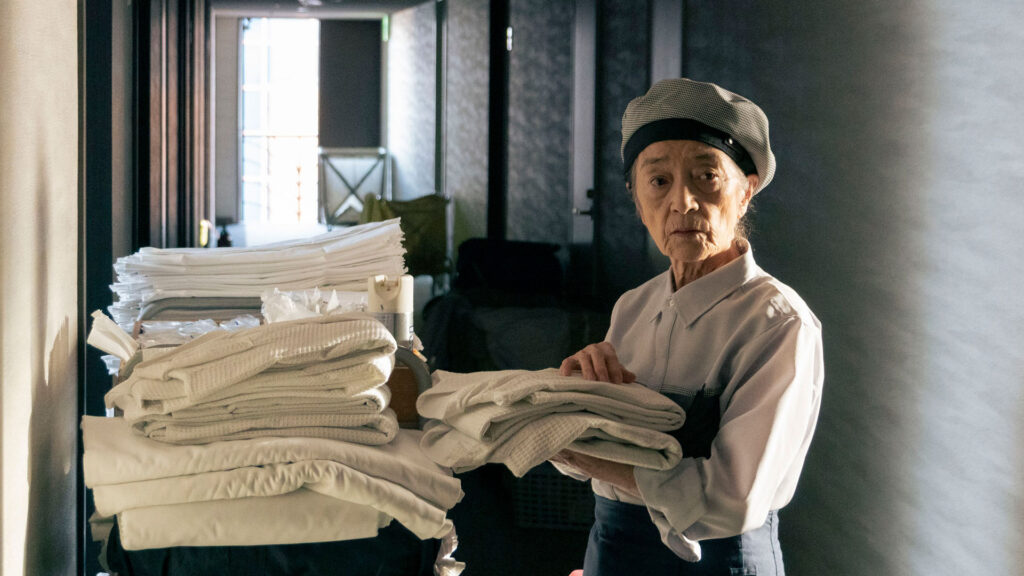
Chieko Baishô in ‘Plan 75’ film. Photo Credit: © Chie Hayakawa, Kimstim Films, Dongyu Club.
THE NATURAL ARISTOCRAT: There’s a term in Japanese known as ‘Kodokushi’ or ‘lonely death’ in which those who perish alone remain undiscovered for long periods of time.
Michi finds a woman who recently passed stooped over a table, TV on. Do you feel this visual is what drives Michi to consider Plan 75?
CHIE HAYAKAWA: Well actually, it’s not the main reason for her to consider Plan 75. It’s more like she lost her job, she lost her friends and she’s losing her place to live. It’s everything together.
She feels more and more isolated from society. Rejected from a society that makes her feel like she’s useless and she’s losing her reason to live.
Of course, the kodokushi of her friend does affect her decision. But it’s more like Michi is not scared of being kodokushi. Instead, she feels strongly that she doesn’t want to be a burden to someone who has to clean up her body or something like that. She doesn’t want to be a burden by being kodokushi herself.
THE NATURAL ARISTOCRAT: I thought at first Yôko Narimiya (actress Yûmi Kawai) was emphatic to Michi. As Yôko went bowling with Michi against the rules and hinted over the phone that it’s not too late to cancel Plan 75.
But the job training scene where they teach recruits to be fully in tune to potential Plan 75 patients to soothe them over made me think otherwise.
What were Yôko’s true feelings toward Michi (if any)?
CHIE HAYAKAWA: Yôko is a person who doesn’t have a sense of guilt about what she does. She doesn’t really care. I mean, Yôko doesn’t think much about the people who she’s talking to on the phone.
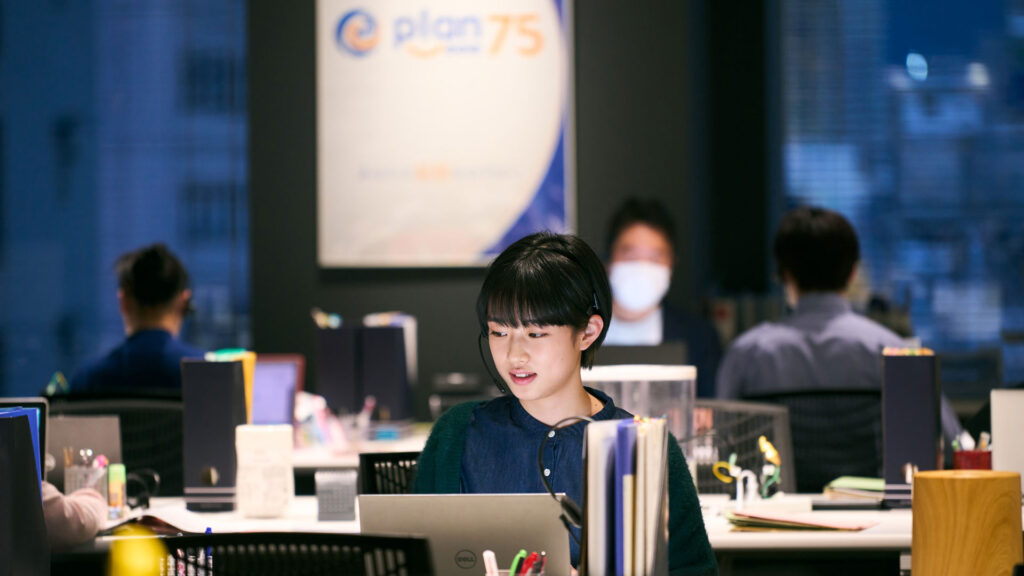
Yûmi Kawai as Yôko Narimiya in ‘Plan 75’ movie. Photo Credit: © Chie Hayakawa, Kimstim Films, Dongyu Club.
She doesn’t imagine what’s going to really happen to these old people because it’s her job. But the reason why Yôko met Michi is because she felt comfortable talking with her and she’s very open-minded.
It doesn’t mean that Yôko tried to help Michi or persuade her not to use a plan… But she more casually just met Michi without any particular reason.
By meeting with Michi, Yôko feels more compassion to her. Yôko starts to realize that what she does is something very inhuman. And what she does, it’s supporting the system which sentences all these elderly people to die.
In that scene where Yôko is listening to the people talking about their job, how to persuade the elderly to complete the plan…. Yôko feels so sick and she realized how inhuman the system is that she’s working for and got involved into.
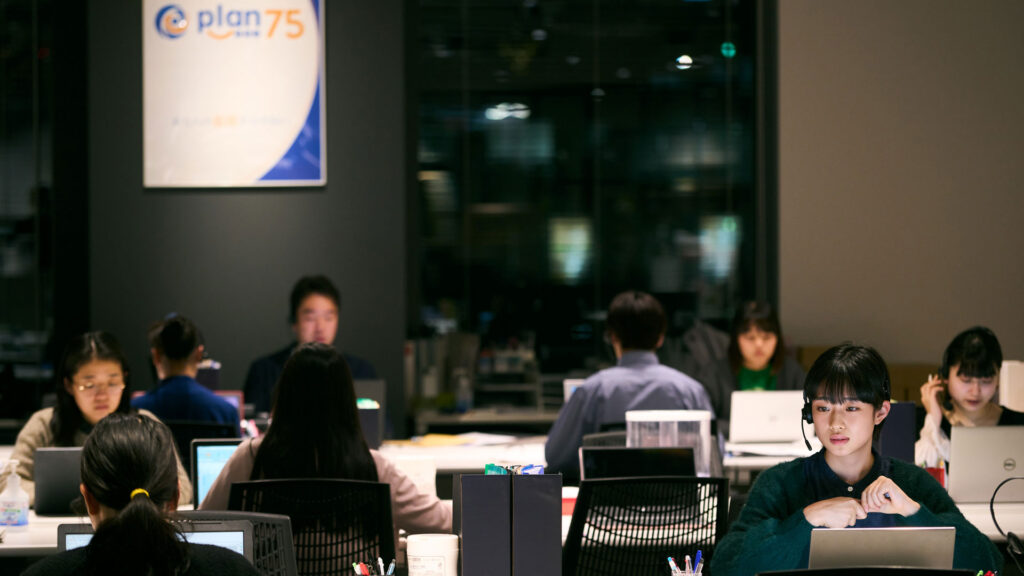
Yûmi Kawai as Yôko Narimiya in ‘Plan 75’ movie. Photo Credit: © Chie Hayakawa, Kimstim Films, Dongyu Club.
That’s why Yôko looks at the camera. It’s raising a question to the audience. Are we part of this cruel system, cruel society? That’s the point of that scene.
THE NATURAL ARISTOCRAT: This film felt incredibly realistic, like peeking into a future news cast.
Can you speak about your creative process to make Plan 75 in the movie sound professionally government structured? Especially the mini ads for Plan 75 throughout the film.
CHIE HAYAKAWA: I didn’t really research government structure on a policy. Instead, I carefully observed the way that government promotes new services and the style of their political campaigns.
The film is a kind of caricature of whatever government may likely to do. I often find that the government tries to rephrase inconvenient truth with nice and friendly terms.
They manipulate public perception with commercials & PR. And the advertising campaign covers up the negative elements of the government and the real issues.
But people get used to these types of propaganda campaigns and it’s accepted.
Which makes people stop critically thinking and become blind to the reality. That’s what I wanted to explicitly show in this film.
THE NATURAL ARISTOCRAT: Was Hiromu Okabe (actor Hayato Isomura) testing out those bench dividers to make sure it’s impracticable for poor elderly to sleep on them? He seemed to be looking to make people slip off them instead of be in pain, but the goal appeared the same.
Was that scene also meant to be connected to the later one about the elderly ‘not requiring physical residency’ for Plan 75?
CHIE HAYAKAWA: Yes, it is connected and Hiromu putting the park bench dividers, that’s his way to get rid of homeless people from laying down on it. The divider is meant to get rid of these people from the public space.
That does exist in Japan from many years ago, like more than 20 years ago. But Hiromu does this because that’s his job. He doesn’t hate these homeless people, he just doesn’t think about them at all.
Hiromu goes along with things and does them in the same way he works for Plan 75.
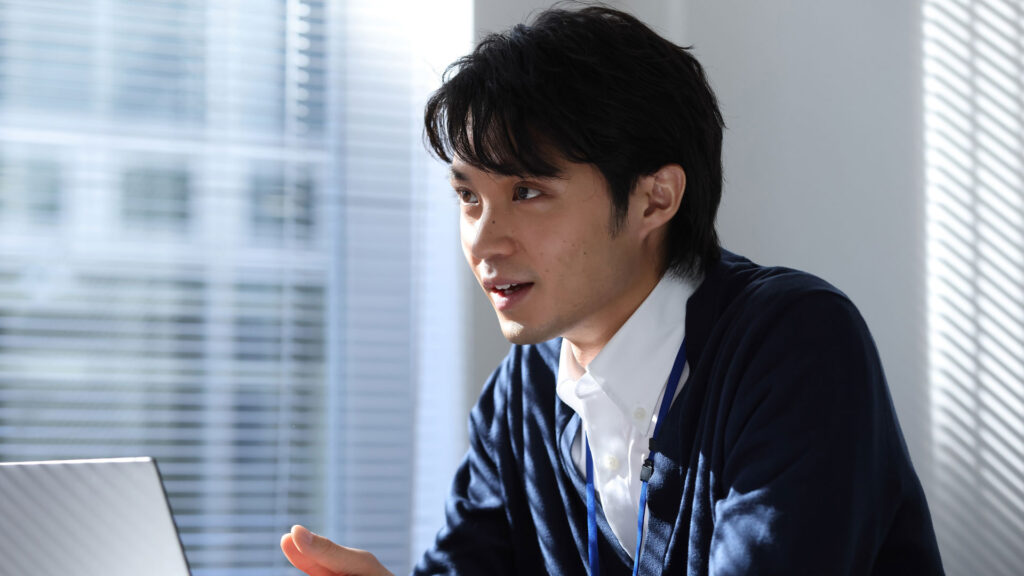
Hayato Isomura in ‘Plan 75’ movie. Photo Credit: © Chie Hayakawa, Kimstim Films, Dongyu Club.
And so it’s Hiromu doing the job to get rid of and eliminate the socially weak people from the society.
THE NATURAL ARISTOCRAT: The scene where someone throws what looks like tomato juice at a sign Hiromu is placing that reads, ‘Plan 75 patients no longer need residency to apply’. Who is meant to be rebelling, unhappy seniors?
CHIE HAYAKAWA: Yes, it’s tomato juice. It could be young people, it could be seniors who got upset about Plan 75 going against the system.
Also, it could be Hiromu’s dream… Because by this moment, he started to feel guilt about what he’s doing after meeting with his uncle.
He started to have a sense of guilt. So that makes him have a dream like that of someone accusing him, blaming him about what he does. That’s why I didn’t particularly show who was the person throwing the tomatoes against him.
THE NATURAL ARISTOCRAT: I thought you placed a big spotlight on the generally poor lifestyle of seniors who are shut out from the work force. How they’re lacking in basic necessities.
I particularly noticed Hiromu’s uncle Yukio Okabe (actor Taka Takao) places eggs outside to ‘chill’ and lacks plates so he eats out of the pot. He repeatedly donates blood.
Have you spoken to seniors who live such a life?
CHIE HAYAKAWA: Well, actually, I didn’t have get this kind of interview. I didn’t interview any male elderly person, but I watched many documentaries on those living alone. They are living, but they don’t.
Many of them have self neglect. They don’t care about how they live. They tend to live in a very rough looking environments. So I got inspiration for the film from that.
THE NATURAL ARISTOCRAT: A television newscast in the film reports consideration for lowering the age to 65. Do you think it would eventually lower to 55 then 45 and so on if allowed to progress?
CHIE HAYAKAWA: Well, rather than lowering the age… I think the government would open up the range of people who apply to the system to including the poor or the disabled or the sick people whom the government have to take care of.
The people who are called the ‘unproductive people’ in society. That’s why I made the number 75 blurred in the Plan 75 logo title treatment in the opening.
It means it could change to a plan also for disabled people, another plan for poor people, or sick people. So yes, I think they will broaden the targets of the plan.
THE NATURAL ARISTOCRAT: Do you feel only strong opposition from young people could truly stop something like Plan 75 from occurring?
CHIE HAYAKAWA: Not only young people, but everyone in any age. The people who accept this system or who follow the rules that the government decides blindly is the most dangerous thing I feel.
I think if people become more aware of what’s going on, what’s happening in this society, that can prevent such a system as it’s being created.
THE NATURAL ARISTOCRAT: There’s quite a few visuals that stay with you in this movie. I found Hiromi assisting an elderly person politely into a wheelchair essentially into Plan 75 quite unnerving.
Michi leaning on the side of the road because her back aches at her job. How did you work out the cinematography for scenes like this for maximum impact?
CHIE HAYAKAWA: I discussed with my DoP (Cinematographer Hideho Urata) that I want to keep distance from the people. I try to observe what’s happening objectively.
I wanted to keep this film less emotional, less sentimental. I wanna keep the dry eye to the story. I understand, it could be more dramatic or it could be a more sentimental film from the story. But I wanted to keep a more cold tone, a more critical view towards the story.
So I think the cinematographer has a very calm and cool, cold view by keeping certain distance. With a fixed and very quiet, torn attitude towards the subject in the moments.
THE NATURAL ARISTOCRAT: Was Hiromu going back to save his uncle but was simply too late? Or was it never his intention to try to actively change his uncle’s decision regarding a Plan 75?
CHIE HAYAKAWA: I think Hiromu knew that it would be too late. But he wanted to give his uncle a proper cremation… Because Hiromu knew that the people in the facility who have no family will be processed like an industrial waste.
If you remember in the previous scene in Hiromu’s office at night, he’s checking the company who’s working for Plan 75, which is an industrial waste company. They’re treating the bodies in an inhumane way.
Hiromu discovered the fact, so he didn’t want his uncle’s body to be taken by this industrial waste company. So even though it’s too late, he needs to take care of his uncle’s body for proper cremation. That’s why he wanted to drive him, post-death.
THE NATURAL ARISTOCRAT: I thought it was remarkably sad that one senior woman was enticed by the glitz and glamour of a resort stay before her Plan 75 visit. As well as Michi being offered a full deluxe course of sushi.
As if they’ll offer anything ‘luxurious’ to push the senior community to go through with Plan 75, rather than maintain their health long term. How do you feel about that?
CHIE HAYAKAWA: It’s something like ‘giving candy’ to persuade them. They make the option look like something nice and beautiful to cover up the inconvenient truth.
And Michi is smart enough to sense that reality, but her friend is insensitive and easy to appreciate what they’re trying to provide. But in fact, she is not so desperate. She has family, she has a daughter who can take care of her.
So she’s not so serious talking about Plan 75. But for Michi, she is a person who mostly likely has no choice but Plan 75. That’s why Michi feels so distant when her friend is talking about the luxury resort.
THE NATURAL ARISTOCRAT: Can you speak about filming the scene where Michi is looking at children playing before going to the Plan 75 medical facility? It’s a brutal contrast. It feels like she is being guilt tripped by society to sacrifice her own being for the next generation.
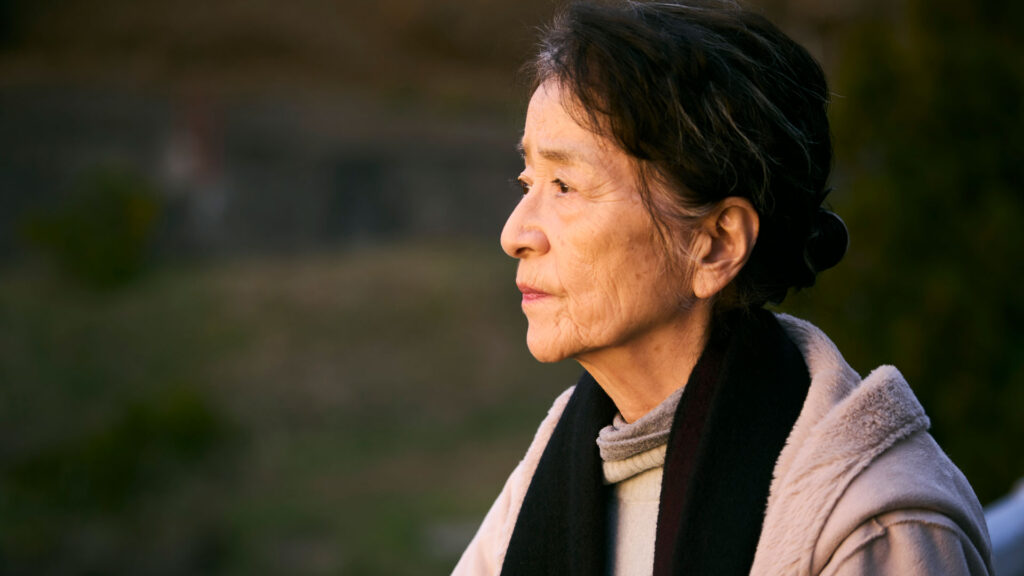
Chieko Baishô in ‘Plan 75’ film. Photo Credit: © Chie Hayakawa, Kimstim Films, Dongyu Club.
CHIE HAYAKAWA: Yes, you can see that it’s brutal. She feels that she has to sacrifice her own being for the young children. And also she might find it’s beautiful to look at these children.
These kids and children are full of life and she wants to stay in this beautiful world. So when she looks at these beautiful kids, she might feel that I don’t want to leave this world yet, or she misses it.
She might remember the times when she was a child and remembering her childhood. So it could be like a sentimental thing, but in many ways it’s very sad how she’s looking at the kids. Michi could have been looking to persuade herself that she’s going to do a good thing by sacrificing herself for these kids.
That’s how she tries to convince herself. There’s mixed feeling in that scene.
THE NATURAL ARISTOCRAT: What do you hope viewers take away from Plan 75 as a film?
CHIE HAYAKAWA: I think it’d be nice if people feel more compassion toward others and have more imagination after watching it.
THE NATURAL ARISTOCRAT: Thanks Chie!
CHIE HAYAKAWA: Thank you!
IFC Center Q & A Session for Plan 75
– Plan 75 will play at New York City’s famous IFC Center starting on April 21, 2023 and concluding on April 27, 2023 (final day).
Here are the exclusive IFC Center Q & A session dates & times with Director Chie Hayakawa:
Friday, April 21: Q&A with director Chie Hayakawa at the 7:10pm show, moderated by Reiko Tahara.
Saturday, April 22: Q&A with director Chie Hayakawa at the 7:10pm show, moderated by Risa Morimoto!
Sunday, April 23: Q&A with director Chie Hayakawa at the 4:25pm show, moderated by Kris Montello!
Not local to NYC? Here are more upcoming screening dates & locations for the film:
Laemmle Glendale – Los Angeles, CA – 5/5/23
George Eastman Museum – Rochester, NY – 5/16/2023
Gateway Film Center – Columbus, OH – 6/2/23
– Future screening dates will also be available at film distributor KimStim Films‘ official website for the film.
About ‘Plan 75’ Filmmaker Chie Hayakawa
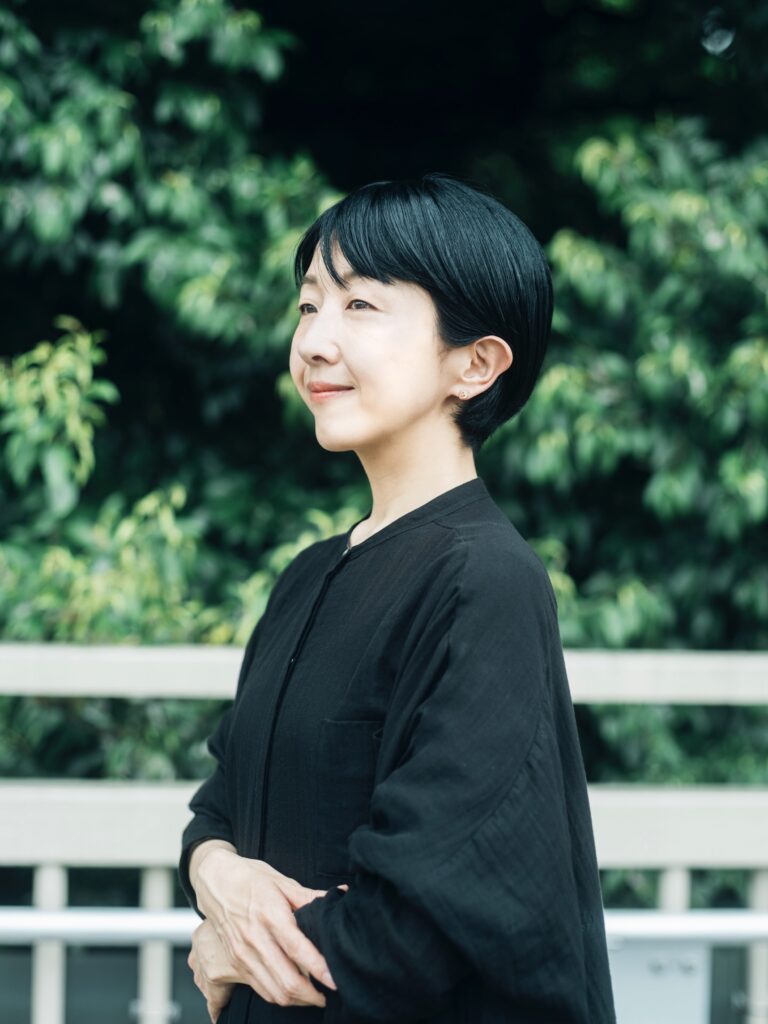
Plan 75 Director Chie Hayakawa Portrait. Photo provided by Kimstim Films.
“Born in Tokyo, Chie Hayakawa studied photography at School of Visual Arts in New York.
Her short film, NIAGARA was selected at Cinéfondation/Cannes Film Festival 2014, won the FIPRESCI Award at Vladivostok International Film Festival, two Grand Prizes at International Women’s Film Festival in Seoul and PIA Film Festival.
Hayakawa’s short film version of PLAN 75 was the opening segment of the feature anthology TEN YEARS JAPAN, executive produced by Hirokazu Kore-eda.
TEN YEARS JAPAN world premiered at the Busan Film Festival in 2018, followed by an international festival tour and successful theatrical releases.
PLAN 75 marks Hayakawa’s feature film directing debut.”
Filmography:
2022 – PLAN 75
2018 – JÛ-NEN: TEN YEARS JAPAN (short- opening segment PLAN 75)
2016 – MAY IN THE WINTER (short)
2015 – BIRD (short)
2014 – NIAGARA (short)
Cinéfondation/Cannes Film Festival 2014
Plan 75 Trailer, Plot Synopsis, Cast
“In a dystopian future, Japan’s government launches PLAN 75, a program encouraging the elderly to terminate their own lives to relieve its rapidly aging population’s social and economic burdens.
In Chie Hayakawa’s remarkable and sensitive feature film debut, the lives of three ordinary citizens intersect in this new reality as they confront the crushing callousness of a world ready to dispose of those no longer deemed valuable.
Legendary Japanese actress Chieko Baishō stars as a 78-year-old Michi who considers signing up for the program after losing her meager but fulfilling hotel job and the means to live independently.
A young Plan 75 salesman Himoru (Hayato Isomura) initially believes in the program’s benefits and serves as the human face of the program. And Maria (Stefanie Arianne), a Filipino care worker living overseas, reluctantly accepts a position with PLAN 75 to send money home to her ailing daughter.
On the surface, the plan and its hawkers exude a kindness that serves as the film’s chilling vision of bureaucratic indifference and our increasing loss of interconnectedness.
However, Hayakawa’s view is far from grim, as these characters soon learn to fully reckon with their own lives and what it truly means to live.”
More exclusive interviews with leading Japanese Cinema Directors
Be sure to read:
– Mayu Nakamura Interview: ‘She is me, I am her’ @ Japan Society
– Naoko Ogigami Interview: Riverside Mukolitta @ Japan Society
– Kimi Takesue Interview: ‘Onlookers’ film @ Cinéma du Réel
Visit the Japanese Films section for the latest reviews, previews, exclusive interviews, and Japanese cinema news.
Nir Regev is the founder of The Natural Aristocrat. You can directly contact him at [email protected] for coverage consideration, interview opportunities, or general comments.

You may like
-
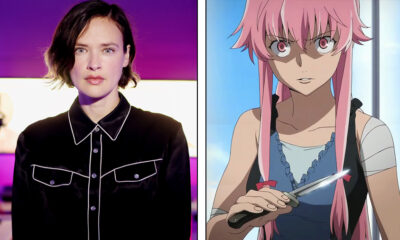

Brina Palencia Interview: Yuno Gasai in ‘The Future Diary’
-
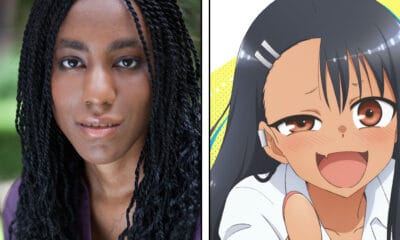

Kimberley Anne Campbell Interview: Voicing Hayase Nagatoro
-


Viktoriya Agalakova Interview: ‘To the Lake’ on Netflix
-


Hannah Emily Anderson talks The Purge’s Jenna Betancourt (Interview)
-
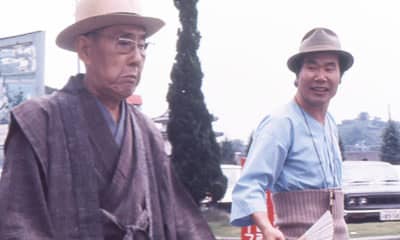

Japan Society: ‘Tora-san Meets His Lordship’ 4K Restoration Impressions
-
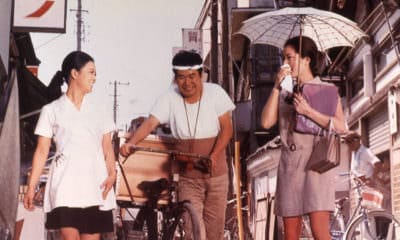

Tora-san’s Runaway 4K Film Restoration at Japan Society Impressions
